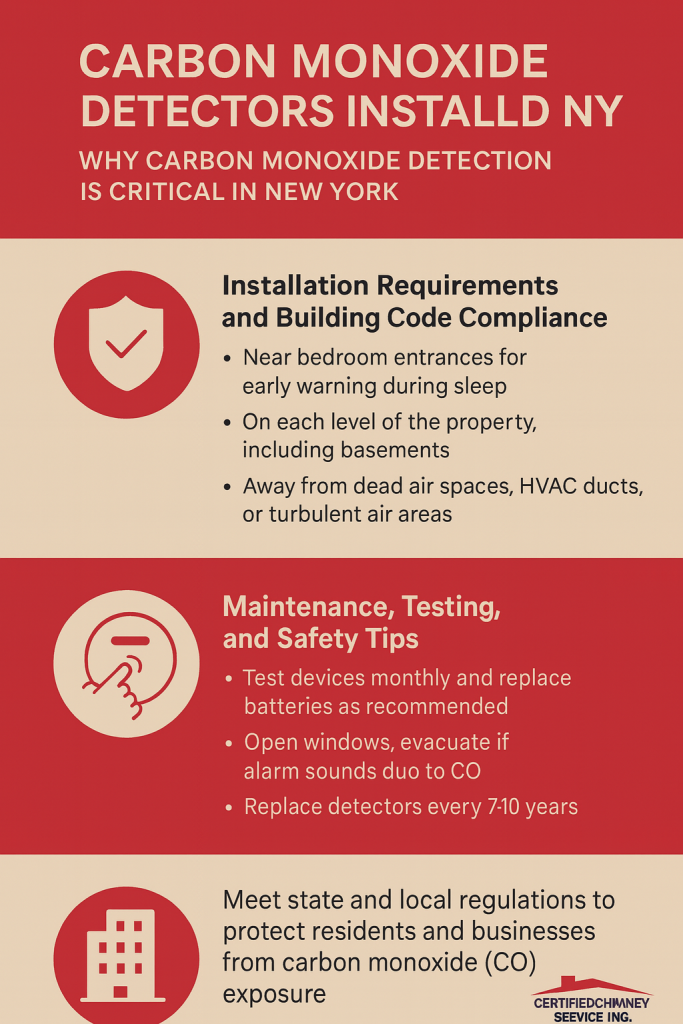Carbon Monoxide Detector Installation in New York
Protect your home from leaks, rust, and costly chimney damage with Certified Chimney’s custom chase covers—built for durability, safety, and curb appeal.
Licensed and Insured
Certified Chimney is fully licensed and insured, giving you peace of mind with every service across Long Island, NYC, and Westchester County.
Certified Experts
Our highly trained, certified chimney technicians uphold the highest standards of safety and quality on every project.
Customer Satisfaction Guaranteed
We prioritize your satisfaction, offering personalized service and expert attention to keep your chimney in top condition.
Why Carbon Monoxide Detectors Are Essential in New York
Every year, families across New York State experience emergencies caused by carbon monoxide (CO) leaks from fuel-fired furnaces, water heaters, natural gas appliances, and even idling motor vehicles. Carbon monoxide is invisible, odorless, and deadly, which is why carbon monoxide detectors are not just a safety measure, they are required by New York State Fire Code, Local Law 126, Amanda’s Law, and city ordinances across New York City and surrounding areas. Having a properly installed carbon monoxide alarm can mean the difference between life and tragedy. According to the CDC, CO poisoning sends thousands of people to emergency rooms each year.
Legal Requirements and Local Building Codes
New York City Building Code and New York State Fire Code outline strict rules for detector placement, occupancy groups, and installation requirements. Local Laws such as Local Law #7 mandate CO detectors in both residential and commercial buildings. Building owners must comply with section 915.3 Detection Locations, ensuring detectors are placed near bedrooms, HVAC ducts, and other detection zones. Compliance is enforced by the Department of Buildings and local fire prevention bureaus. For more details, see NYC.gov.
Placement and Installation Guidelines
Proper detector placement is crucial. Manufacturer’s instructions and NFPA 720 recommend avoiding dead air spaces, damp areas, or turbulent air spaces near HVAC systems. CO alarms should be installed outside bedroom entrances, on each floor, and close to fuel-burning appliances like boilers, fireplaces, and water heaters. Options include battery-powered detectors, hardwired detectors, 10-year battery CO alarms, and combination detectors with smoke alarms. Following manufacturer specifications and testing procedures ensures detectors perform as intended.

Maintenance and Lifespan of Detectors
CO detectors are not “install and forget” devices. Batteries must be replaced regularly unless the unit is equipped with a sealed 10-year battery. Even with hardwired detectors, backup batteries are required. Detectors should be tested monthly with approved test devices, and most models must be replaced after 7–10 years, depending on the manufacturer’s specifications. Homeowners and building owners should also open windows and call the fire department if a carbon monoxide alarm sounds to avoid dangerous exposure.
Professional Installation and Safety Testing in NY
While some battery-operated detectors are simple to mount, professional installation ensures compliance with electrical systems, building codes, and fire codes. Certified installers can handle hardwired detectors, verify power sources, and ensure proper placement in line with New York State and local requirements. For building owners and homeowners alike, professional installation provides peace of mind that safety measures meet life safety system standards.
See All Services
Don’t Hesitate to Reach Out – We’re Here to Help Every Step of the Way
Testimonials
See Why Homeowners Trust Certified Chimney
